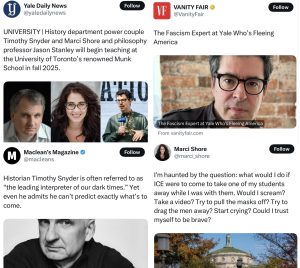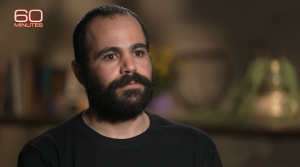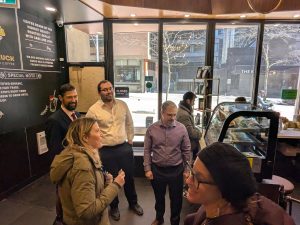MICHAEL POSNER: The following excerpt from Leonard Cohen, Untold Stories: From This Broken Hill touches on Cohen’s first European tour in 1972 and the documentary film, Bird on a Wire, that was later made about that tour, by British director Tony Palmer. We also hear briefly from Barrie Wexler, then a close friend of Cohen’s, Jack Lazare, a friend from summer camp, and Charmaine Dunn, who became an important part of Cohen’s life in this period.
(More with Michael Posner discussing the book on The CJN Daily podcast with Ellin Bessner.)
***
Early in the new year, alone, Cohen returned to Hydra to continue work on the new poetry volume. Barrie Wexler had rented part of a house with no central heating. One cold morning, he heard a disturbance outside.
BARRIE WEXLER: It was Cohen, with one of those old-fashioned metal oil heaters, full of kerosene. There were a hundred steep steps from his house to mine, and he’d hauled this thing all the way up. He trundled in with a big grin, the one he wore when he was particularly pleased with himself. It really saved my hide that winter. I took it back in the spring, downhill and empty, and couldn’t believe how hard that was.
From Hydra, Cohen wrote to Marianne Ihlen, calling their former island home “one of the last peaceful places left in my world.” He had been thinking about her often and wanted her to know that what happened between them, their break-up, was not her fault or his. “It was meant to be and we must forgive one another.” As he frequently did, Cohen also arranged to send her money—on this occasion, one thousand dollars.
Cohen was back in Nashville—with Elrod—by early March, rehearsing for his forthcoming European tour. Paul Saltzman arrived, but their dynamic had shifted. Saltzman was no longer a casual friend or concert promoter—he was a journalist, reporting for Maclean’s magazine. Busy rehearsing, Cohen seemed reluctant to be interviewed. Eventually, Elrod left for Miami and Cohen did the interview, telling Saltzman he had “lived a lot better when I had less money… My standard of living went down as my income increased.” Saltzman insightfully concluded that Cohen was “searching for the matter of which he is made… There are many parts of Leonard Cohen that Leonard doesn’t like, even hates. Once, I asked him if he liked himself. He thought for a moment and said, ‘I like my true self.’” After Elrod left, Charmaine Dunn appeared.
CHARMAINE DUNN: He was living in someone’s guesthouse, out of town. We did go to Bob Dylan’s house one night and raided the fridge. He wasn’t home. We were also at the studio, but Leonard wasn’t recording. He got in there and sang backup on someone else’s tunes. It was very late at night.

Later that month, Cohen embarked on a 21–date European concert tour, beginning at Dublin’s National Stadium. Afterward, the owner of the city’s River Club brought Cohen to his venue; there, after a few drinks, Cohen delivered an hour-long impromptu concert. From Ireland, the tour continued to ten other countries. Joining the band as a backup singer was Jennifer Warnes. She had been appearing on a TV show with Waylon Jennings when someone asked if she knew anybody who wanted to sing on the next Leonard Cohen tour. “Send me,” she said. Warnes sang a few Cohen songs a cappella at an audition and was told, “Get your passport.” Almost inevitably, a Cohen-Warnes romance ensued.
JENNIFER WARNES: I fell in love with him and realized that the line of women was longer than I could deal with. I made a decision to become an artistic friend, rather than a romantic friend, because there was no way I could be his only girl. I put all my energy into the music, and that developed into a serious, full-time creative friendship. Leonard approached each moment as an act to be shaped. His life is an art form.
Cohen had consented to the tour reluctantly, pressured by Marty Machat. Singing his songs night after night, he felt, degraded them. And, he was convinced, he was a poor stage performer, with a mediocre voice.
TONY PALMER: I told him, “You’re talking nonsense. You have a rather beautiful voice—very personal, absolutely clear, very simple. We know you’re singing from the heart. Please stop banging on about your voice.”
Palmer, a British filmmaker, had been summoned by Machat to New York the previous October to discuss making a documentary of the tour.
TONY PALMER: The first thing Marty said was, “Leonard, I’d like you to leave for a moment.” I thought, “What the hell is going on?” But that was the reason—Leonard didn’t know that Columbia might not renew his contract. So Marty’s most important client did not want to tour and might not have a record contract. That was commercial suicide. That’s why Marty desperately wanted this film and that’s why Marty paid for it—the original version.
STEVE MACHAT: He was not going to be dropped. What Dad did was get Columbia to let him do the film. Dad put all the money in. Dad knew this film would one day be a historic record of the young Cohen. What he may have said to Tony, because Dad loved Leonard and thought he deserved a bigger record deal, was, “I’m gonna make this film and get him off Columbia,” because Columbia in the U.S.A. had no time for him. His U.S. sales did not exist. Dad believed that if my generation knew Leonard like he did, Cohen would gain the recognition Dad felt he deserved.
BARRIE WEXLER: Cohen knew he was skating on thin ice with Columbia. He didn’t always have the best instincts when it came to business. He was fighting depression and the sense that the whole fledgling enterprise might collapse. He said he didn’t care, but he absolutely did, and relied heavily on Marty, who was more astute.
With his contract apparently in jeopardy, Cohen had approached an old Montreal friend, Jack Lazare. He and his brother, Dan, were running Aquarius Records, with concert promoter Donald K. Donald (a.k.a. Donald Tarlton).
JACK LAZARE: Leonard was worried Columbia would drop him and started to talk to us about being his record company. He ended up staying with Columbia, of course. Wise decision. We weren’t in a position to do the international thing, which is where his base was. But we did put things on paper. Leonard did this alone. It was very personal. My feeling is he really would have liked to, but it didn’t make financial sense.
Lazare eventually left the music business in 1982.
JACK LAZARE: I couldn’t stand working with egomaniacs. Leonard was sometimes in his own mystical, poetic world—but he was straight, a good person and a delight to be with. Obviously, he was in a quest all his life. I suspect he did not find the answers, but I suspect nobody finds the answers. But the persona he gave in concerts was very real. That was him. Absolutely a class act.
When Tony Palmer arrived in New York, he wasn’t quite sure what the project was, and he had brought along one of several books of Cohen’s poetry that he owned.
TONY PALMER: It actually broke the ice, because he said, “So you know I’m a poet.” I said, “That’s how I first came across you. It was only later I realized you also sang.” He thought that was very funny. He was extremely clear what he didn’t want the film to be—“and then we did this and then we did that.” He didn’t want a film that portrayed him as a writer of “sentimental little love songs.” He wanted to emphasize the political—small p—aspect of the poems and the songs. I told him, “Whatever happens, we’ll be there. Don’t ever close the door. I’m not going to interview you. I’ll be a fly on the wall.” He liked that. We also agreed to film every fifth concert. He liked that, too. He said, “Oh, four to rehearse and one to film.” I think we filmed four entire concerts.
In theory, this approach would have allowed Palmer to use different verses of the same song from different concerts. In fact, it proved more complicated, because when Cohen sang “Suzanne,” for example, he often sang it at different tempos and with different words, at different venues. In London, on Mar. 23, 1972, Cohen sang, for the first time, “Chelsea Hotel No. 2,” the song that famously alluded to Janis Joplin’s performance of fellatio in New York. On the liner notes to his 1974 album, New Skin for the Old Ceremony, Cohen acknowledged that the song referred to “an American singer who died a while ago”—Joplin died Oct. 4, 1970. It wasn’t until May 25, 1976, in Montreux, that he publicly cited Joplin by name. “She would not have minded,” he explained. “My mother would have minded.” Later, Cohen regretted his admission, saying he had never spoken in concrete terms about his intimate relationships, and he apologized for the indiscretion.
If Cohen rued his disclosure, Joplin seems to have rued the encounter itself, as she told interviewers Richard Avedon and Doon Arbus.
JANIS JOPLIN: Sometimes you’re with someone and you’re convinced that they have something to tell you. So maybe nothing’s happening, but you keep telling yourself something’s happening… He’s just not saying anything. He’s moody or something. So you keep being there, pulling, giving, rapping. And all of a sudden about four o’clock in the morning, you realize that, flat-ass, this motherfucker’s just lying there. He’s not balling me. That really happened to me… Twice. Jim Morrison and Leonard Cohen. And it’s strange, ’cause they were the only two that… I wanted to know. And they both gave me nothing.
Years later, Cohen offered a characteristically insightful analysis of Joplin’s essential predicament.
LEONARD COHEN: There are people that make their work beautiful in a way that they can never make their lives or their bodies beautiful…
Leonard Cohen, Untold Stories: From This Broken Hill is the second volume in a trilogy by Toronto writer Michael Posner, published by Simon & Schuster, from which this excerpt was taken.
(More with Michael Posner discussing the book on The CJN Daily podcast with Ellin Bessner.)







